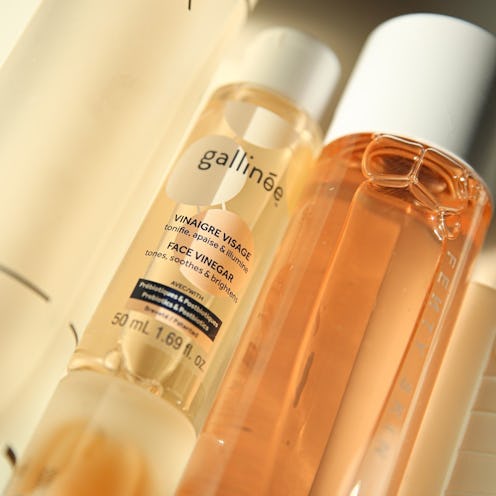(Beauty)
Your Skin’s Microbiome Is In Need Of Attention — These Products Will Help

While you were chewing up lactobacillus tablets and guzzling kefir to cater to the bacteria in your gut, there's another microbiome that's much more visible that probably hasn't received nearly as much attention until now — your complexion. The bacteria on your face need just as much TLC, and it's worth investing in the best microbiome skincare products to keep them in check. But before you do, it's helpful to know what your microbiome actually is and how it's affected.
"The skin's microbiome is a community of diverse organisms ('good' bacteria, viruses, and fungi) that live on the surface of our skin. The balanced microbiome lives together in harmony to help protect a healthy skin barrier and protect against pathogens," says board-certified dermatologist Dr. Tiffany J. Libby to TZR via email. This protective environment of sorts sounds great, but there are several factors that can throw off its balance.
Libby explains that everything from poor diet and stress to over-cleansing and over-exfoliating can mess with the bacteria living on your skin. "When we disrupt the microbiome, skin can become vulnerable to overgrowth of 'bad' microorganisms and lead to infections, or inflammatory skin conditions like acne, rosacea and eczema," she says.
But other than diet, hydration, and overall wellness, keeping it healthy also comes down to closely examining the products in your routine. Laura Marinelli, PhD, microbiologist and scientific advisor at Ellis Day Skin Science, tells TZR over email that this also includes the ones that say they're good for your microbiome, too.
"An increasing number of products claim to promote the health of the skin microbiome. However, it’s important to remember that this is still a relatively new area of research and, at this point, we know a lot more about what ingredients harm the microbiome than we do about those that can directly benefit it," she says, suggesting people try clean formulas that include ingredients like hyaluronic acid, squalane, glycerin, and ceramides.
"Products that contain prebiotics contain ingredients that help provide the nourishment for a healthy microbiome, whereas products with probiotics contain the actual microorganisms to help build back the microbiome," says Libby. But she does warn that, for probiotics (with an "o"), which are more common to find in skincare currently, the verdict is still out on whether they actually hinder or help. All this aside, both Libby and Marinelli agree that a great place to start is with a low pH cleanser.
"Regular bar soap, and even some facial cleansers, have a high pH (of nine to 10), which can increase skin alkalinity, thereby harming your native skin bacteria and promoting the growth of harmful microbes. A better alternative is a low-pH facial cleanser," says Marinelli. She personally recommends REN's Gentle Cleansing Milk, Glossier's Milky Jelly, and Fresh's Soy Facial Cleanser, all of which have lower pHs.
But if there is a cleanser that already works well with your skin, there are pH-balancing toners and serums available to keep things in check if your cleanser can't.
Aside from your cleanser, Marinelli says to avoid products with "broad-spectrum antimicrobial activity, such as benzoyl peroxide, triclosan, or high concentrations of alcohol," as it can rid your skin of beneficial microbes. She recommends adding in a serum, like Ellis Day Skin Science's Wild Resilience Active Phage Serum, which has a mix of bacteriophages spare the good bacteria, only killing off a specific type — Cutibacterium acnes — which can cause acne and inflammation.
You can follow similar guidelines with serums and moisturizers. "Look for clean products that incorporate some of the ingredients I mentioned above, such as hyaluronic acid, squalane, and ceramides, and that don’t have a lot of artificial fragrances or preservatives," Marinelli says, suggesting Drunk Elephant's Protini Polypeptide Cream and First Aid Beauty's Ultra Repair Face Moisturizer.
Take a deeper dive into products that help promote a healthy microbiome, and shop the list, below.
We only include products that have been independently selected by The Zoe Report's editorial team. However, we may receive a portion of sales if you purchase a product through a link in this article.